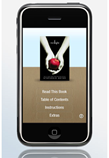 How to optimize ebooks so they look spiffy and are as fun and easy to use as possible?
How to optimize ebooks so they look spiffy and are as fun and easy to use as possible?
Is E Ink really the ultimate? Are today’s e-readers good enough?
Chewing this over at Digital Book World were Josh Koppel of ScrollMotion (product in photo), Andrew Malkin of Zinio, Brad Inman of Vook, Maja Thomas of the Hachette Book Group, Eric Freese of Aptara and Laura Dawson of LJNDawson, the moderator. Some notes on the various panelists:
ScrollMotion: Joseh Koppel founded the company because he was disappointed that a digital book was defined as just high resolution text. iPhone is what inspired him.
He demonstrated Iceberg. Paginated experience. Important to maintain cause page number always changing was disappointing for a user. Tried to come up with good method of brewing. First to do individual apps as books and has been very successful. Over 6,000 apps.
Trade books easy compared to graphic and kids books. New kids reader – Iceberg Kids. Can move around the image and still allow full zoom. Can add recordings. Has magazine product. Pagination in a magazine not very important so added an easy scrolling mechanism instead of a paginated experience, with a good search engine and table of contents.
Zinio: 50,000 magazine issues. Adding books. 24 languages and 140 countries. Moving into mobile devices. Good application for verticals. Just launched iPhone app. Should grow to 200 magazines on iPhone. Will be on Android and Symbian. Partnering with hardware manufacturers and consumer sales outlets.
Vook: Creating a new category of books and a new form. Showed a Vook of Shakespeare Sonnet 40. Video, animation, annotation. Publish between 500 and 750 titles this years. Putting filmmaker and author together creates a new form of work. Still experimental. Cost of books is from a few hundred to a few thousand dollars. Filmmakers get base and royalties. 750 – 1,200 books is when begin to break even.
Aptara: Traditional print practices don’t translate well to new models and retrofitting is not efficient and very expensive. Plan for digital delivery first and then let the print support that. Use device agnostic format and then transform it depending on the particular device. 25 years ago military was using XML for their publications.
Hachette Book Group: Head of digital publishing. Isn’t so simple. Making enriched titles. Where do you start in the transformation to enriched book? Labor intensive to transform a book and who makes decisions as to what are the enhancements? Works best when ideas come from authors. Need the enhanced concepts to be present at acquaint if to work best. If do it later then have to sell it to the agent. Marketing team and digital selling team need to work together.
To do an enriched book: figure out the strategic advantages/disadvantages, how do do cost/benefit with unknown market, how to develop for many platforms, hire people for each platform? rights management for music videos, contracts. etc. Many times don’t have rights to do an enhanced book and need to get them form the agent. Is a new product a new ISBN? DRM? Marketing strategy in an unknown market?

































A very disappointing set of comments.
Scrollmotion and Zinio are too concerned with maintaining page-centric presentation aspects. Pagination shouldn’t be a concern; accessing text sections (like chapters) and marking your place are more important. And Zinio’s “digital pages” are too rigid in presentation.
Hachette sounds like they are afraid to innovate: Let the author do it (presumably so you can whittle away their royalties for your effort).
Only Vook and Aptara sound like they understand what’s going on. Aptara’s idea to start with the digital content is spot-on. Vook sees that we’re in an experimental stage. These companies will figure things out before the others (and probably make as much money selling their solutions as publishing with them).